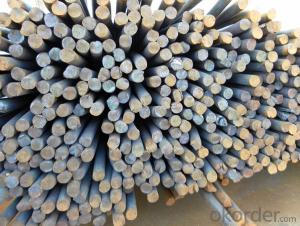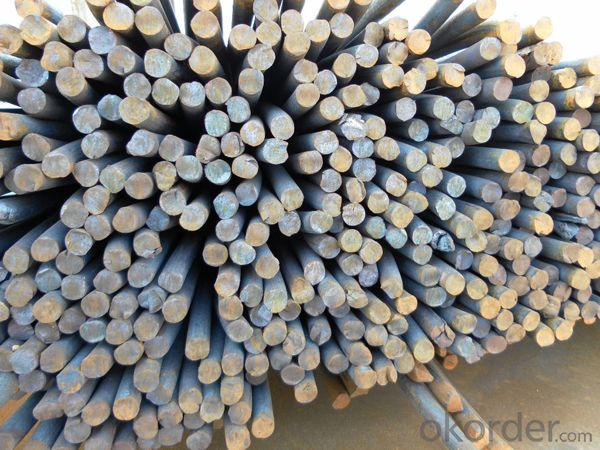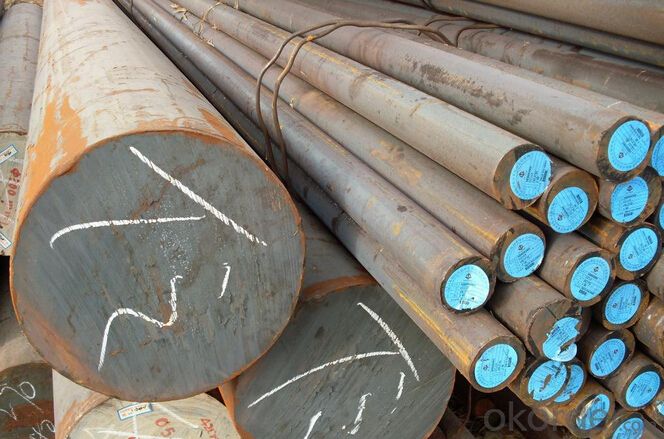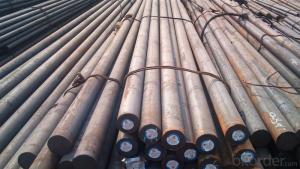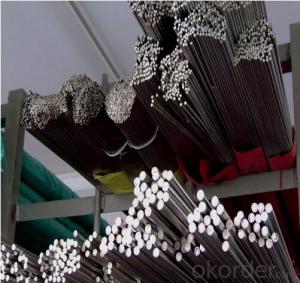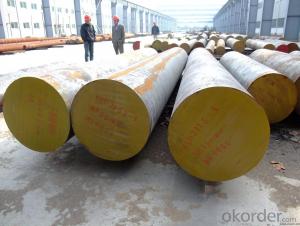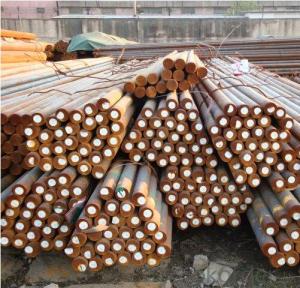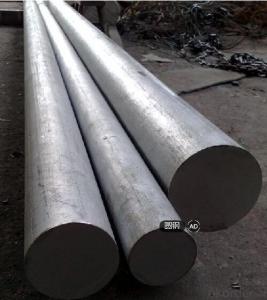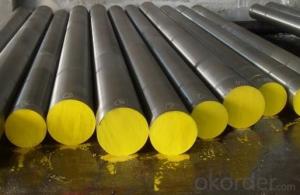Cr12MoV, SKD11, D2,D3, 1.2379 Round Bars
- Loading Port:
- China main port
- Payment Terms:
- TT OR LC
- Min Order Qty:
- 30 m.t.
- Supply Capability:
- 10000 m.t./month
OKorder Service Pledge
OKorder Financial Service
You Might Also Like
Specification
Cr12MoV, SKD11, D2,D3, 1.2379 Round Bars
Product Information:
High quality and reasonable price forged alloy tool steel round bars black/grinding/round turned surface grades Cr12, Cr12Mov, SKD11, 1.2379, D2, D3. ESR available. UT-pass SEP 1921-84 C/c. Quality carefull monitoring.
Product Overviews:
| Product Name | Typical Grades | Diameter(mm) | Standard adopted |
| Carbon Steel | 20 (1020/S20C/C22) | Ø16-Ø300 | GB/SAE/JIS/DIN |
| 40 (1040/S40C/C40) | |||
| 45 (1045/S45C/C45) | |||
| Bearing Steel | GCr9 (51100/SUJ1) | Ø12-Ø250 | |
| GCr15 (52100/SUJ2/100Gr6) | |||
| GCr9SiMn (A485-Gr.1/SUJ3) | |||
| Cr-Mo Steel | 20Cr (5120/SCr420H/20Cr4) | Ø12-Ø250 | |
| 40Cr (5140/SCr440/41Cr4) | |||
| 42CrMo(4140/SCM440/42CrMo4) | |||
| Gear Steel | 20CrNiMo | Ø16-Ø600 | |
| 20CrMn(5115/SMnC420/20MnCr5) | |||
| 20CrNiMo(8620/SNCM220/20CrMiMo2) |
Product Show:

Our Advantages:
· Industry experience over 20 years.
· Shipment of goods -More than 70 countries worldwide.
· The most convenient transport and prompt delivery.
· Competitive price with best service.
· High technical production line with top quality products.
· High reputation based on best quality products.
With our experienced, enthusiastic and dynamic staffs, we assure to bring you the products with best quality, reasonable prices and good after-sales services under the motto: Friends First, Business After.
Communication, Experience, Expertise and Best efforts are our Promises to you.
- Q: How is high-temperature steel used in the production of furnace components?
- High-temperature steel is extensively used in the production of furnace components due to its exceptional heat resistance. It allows furnace components to withstand the extreme temperatures and harsh conditions encountered during the heating process. This steel is specifically designed to maintain its strength, shape, and structural integrity even at elevated temperatures, ensuring the longevity and efficiency of furnace operation.
- Q: What are the different methods of preventing intergranular corrosion in special steel?
- Various techniques are available for preventing intergranular corrosion in special steel. 1. Heat Treatment: A highly effective approach involves subjecting the steel to solution annealing, a heat treatment process. This method entails heating the steel to a high temperature and rapidly cooling it. By doing so, any precipitates or carbides that may have formed along the grain boundaries are dissolved, thereby reducing the risk of intergranular corrosion. 2. Alloying: Another strategy is to introduce specific alloying elements into the steel composition. For instance, the addition of elements such as chromium and molybdenum can enhance the steel's resistance to intergranular corrosion. These alloying elements create a protective oxide layer on the surface, preventing corrosion along the grain boundaries. 3. Passivation: Passivation involves treating the steel surface with chemicals that establish a protective layer. This layer acts as a barrier, safeguarding the grain boundaries from the corrosive environment. Common passivation techniques include acid pickling and electrochemical methods. 4. Sensitization Control: Particular attention must be given to controlling the sensitization process. Sensitization occurs when the steel is exposed to high temperatures for an extended period, resulting in the precipitation of chromium carbides along the grain boundaries and rendering the steel vulnerable to intergranular corrosion. By carefully controlling the heating and cooling rates during processing, sensitization can be minimized or prevented. 5. Corrosion Inhibitors: Another option is the utilization of corrosion inhibitors, which are chemicals that can be applied to the steel surface to protect it from corrosion. These inhibitors form a protective film on the surface, preventing corrosive agents from attacking the grain boundaries. It is important to consider that the choice of method depends on the specific type of special steel and its intended application. Selecting the most suitable approach requires a comprehensive understanding of the steel's composition, processing conditions, and the expected corrosive environment.
- Q: What are the different joining processes for special steel?
- There are various joining processes for special steel, including welding, brazing, and soldering. Welding involves melting the steel and fusing it together, while brazing uses a filler metal with a lower melting point to join the steel parts. Soldering, on the other hand, uses a lower melting point alloy to create a bond between the steel pieces. Each process has its own advantages and limitations, and the choice depends on factors such as the type of steel, the desired strength of the joint, and the application requirements.
- Q: How is special steel used in the power generation industry?
- Special steel is used in the power generation industry for various applications such as turbine blades, generator shafts, and boiler tubes. The high strength, corrosion resistance, and heat resistance properties of special steel ensure efficient and reliable power generation. Additionally, special steel is used in the construction of power plant infrastructure, including pipelines and structures, to enhance durability and safety.
- Q: What are the different nitriding techniques used for special steel?
- There are several nitriding techniques used for special steel, including gas nitriding, salt bath nitriding, plasma nitriding, and ion nitriding. These techniques involve exposing the steel to a nitrogen-rich environment, which allows nitrogen atoms to diffuse into the surface of the steel, forming a hardened layer. Each technique has its own advantages and is suitable for specific applications based on factors such as the steel composition, desired hardness, and surface finish requirements.
- Q: How is nitriding steel used in the manufacturing of engine components?
- Nitriding steel is commonly used in the manufacturing of engine components due to its ability to improve their hardness, wear resistance, and fatigue strength. By subjecting the steel parts to a controlled nitrogen-rich environment, the process of nitriding forms a hard surface layer on the components, enhancing their durability and reducing the chances of premature failure. This makes nitrided steel components well-suited for use in engine parts such as crankshafts, camshafts, and valves, where high strength and resistance to wear are crucial for optimal performance and longevity.
- Q: How does the alloying elements affect the properties of special steel?
- Alloying elements have a significant impact on the properties of special steel. By adding specific elements in controlled quantities, the strength, hardness, corrosion resistance, and other desirable properties of steel can be enhanced. For example, the addition of chromium can improve stainless steel's corrosion resistance, while molybdenum can enhance its strength and toughness. Similarly, elements like nickel, vanadium, and tungsten can influence various properties of special steel, making it suitable for specific applications in industries such as automotive, aerospace, and construction. Overall, alloying elements play a crucial role in tailoring the properties of special steel to meet the requirements of diverse applications.
- Q: Can special steel be used for making oil and gas industry components?
- Yes, special steel can be used for making oil and gas industry components. Special steels, such as stainless steel and alloy steel, are often preferred in the oil and gas industry due to their exceptional mechanical properties, corrosion resistance, and high temperature resistance. These components are exposed to harsh operating conditions, including corrosive environments, extreme temperatures, and high pressures. Special steels are specifically designed to withstand these conditions and maintain their integrity and performance over time. The use of special steels in the oil and gas industry ensures the reliability, durability, and safety of critical components, such as valves, pipes, fittings, and drilling equipment.
- Q: How is electrical steel used in the manufacturing of transformers?
- Electrical steel, also known as silicon steel, is crucial in the manufacturing of transformers. It is used to construct the core, which is the heart of the transformer. The unique magnetic properties of electrical steel allow it to efficiently conduct and transfer electrical energy. By laminating thin layers of electrical steel together, the core minimizes energy losses through eddy currents and hysteresis. This ensures optimal performance, high efficiency, and reduced heat generation in transformers.
- Q: How does special steel contribute to improved product performance?
- Special steel contributes to improved product performance by providing enhanced strength, durability, and resistance to wear and corrosion. It offers superior mechanical properties and can withstand extreme temperatures, pressures, and impacts. The use of special steel in manufacturing leads to longer-lasting products, improved efficiency, and enhanced safety. Additionally, its versatility allows for customization and innovation, enabling the creation of more advanced and high-performance products across various industries.
Send your message to us
Cr12MoV, SKD11, D2,D3, 1.2379 Round Bars
- Loading Port:
- China main port
- Payment Terms:
- TT OR LC
- Min Order Qty:
- 30 m.t.
- Supply Capability:
- 10000 m.t./month
OKorder Service Pledge
OKorder Financial Service
Similar products
Hot products
Hot Searches
Related keywords
